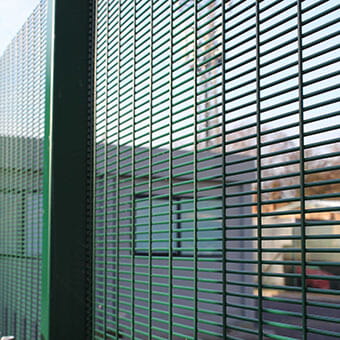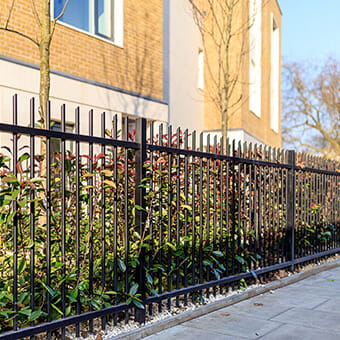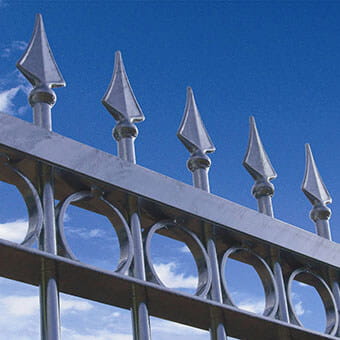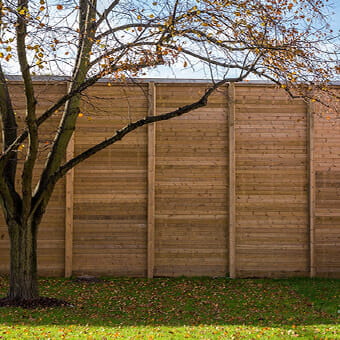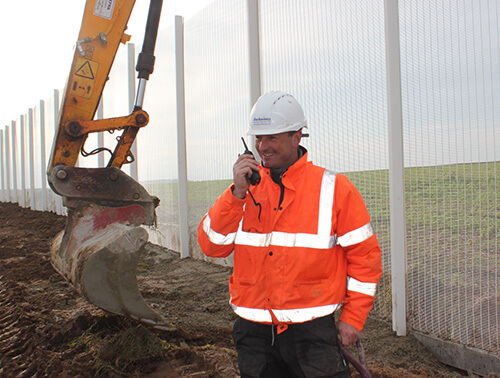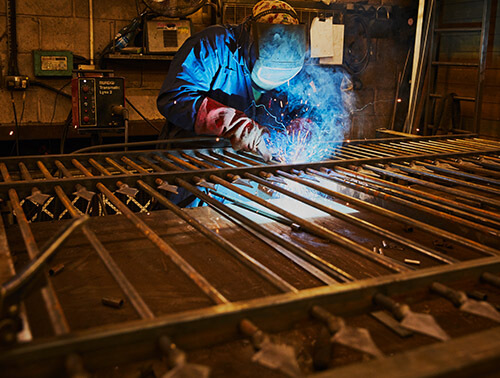Our other sites:
Like with anything, fence designs regularly evolve to include innovations and keep up with trends, whether it is new materials or fixings, different finishes, coatings, and colours, or creative designs with unconventional pale arrangements or mesh patterns. The reasons for creating a new fence design can be to improve aesthetics, climb resistance, cost efficiency, security, longevity, safety, and help protect wildlife.
Fence design is an important consideration for any site, with some factors taking prevalence over others depending on requirements. It’s essential to think about the following when choosing a fence rather than looking purely at the appearance of the fence, which is often the case when a fence is being used for demarcation.
Risk of entrapment
UK building regulations state that the maximum permitted gap between pales in a fence is 100mm. This ensures children cannot slide through gaps and become stuck. However, there is a balance required. If the gap is large enough to be able to put an arm through but too narrow to easily remove it, limbs can get stuck. This is why we created our Anti-Trap bow top fence design. Installed as a short height demarcation fence, there is a high possibility that children will put limbs or even necks between the hoops, so we have spaced them further apart to ensure there is no risk of entrapment.
Over the years we’ve seen a number of fence designs with a unique appearance which could increase the risk of entrapment, and do not add any benefit other than to the aesthetic.
Some examples include:
Wildlife getting stuck
Remember that it is not only humans that can be trapped in fences. As we become more aware of our surroundings, the design of a fence may need to be changed to combat other environmental problems. Sometimes, a certain type of fence design is unavoidable, particularly when it comes to high security. Sadly, wildlife such as foxes and hedgehogs can get stuck in chain link and V mesh fencing, so where possible and particularly in areas where wildlife thrive, specify fencing which allows wildlife to roam freely. Our vertical bar fencing and metal railing pages on our website indicate that the product is hedgehog friendly and we also have a blog post on the subject.
There are a number of aesthetic solutions which increase protection against climbing or add interest. Look at our Tri-Guard, Barbican Extra, and Barbican Defender Extreme.
Remember that any fence with a sharp topping should be installed above 2m high and display a warning sign to prevent the public from being accidentally harmed.
Longevity of materials and practicality
Wrought iron railings were used heavily in the 18th century through to the mid 90s, and many urban areas are still keeping this characteristic alive which means they must be restored or replaced with similar looking designs. Wrought iron railings require high maintenance; needing painting every year to keep them looking their best, and also being more complicated to install. Traditional railings must be welded on site by a specialist. Modern versions use bolts to connect panels to posts but this detracts from the grandeur of wrought iron railings and also makes them less secure as bolts can be removed. To counter these common issues, Jacksons created a range of lookalike products in tubular steel which is strong and lightweight, and hot dip galvanised for excellent protection against rust and corrosion. With a 25 year guarantee and the option to polyester powder coat in an architectural grade finish, maintenance is reduced to simply cleaning with a damp cloth when necessary.
In playgrounds and schools, peeling paint and splintered timber are a recipe for injury with children often in close contact with a fence either by leaning or climbing. Any timber fences should be planed, and metal fences should have a high quality powder coating that does not crack or chip which will keep it looking good for years.
Danger of vandalism
The way that some fences are designed unfortunately sets them up to fail due to vandalism. This is largely down to the construction and fixings used. Fixings that are on display and accessible from the outside can be tampered with, and when mesh panels are so lightweight they can easily be removed and even replaced to cover tracks. Choosing the correct fence for the application also plays a part here. For example, a timber picket fence is fine for a private garden, but anywhere at risk of vandalism such as a children’s playground is not just annoying to have to clean up, but it can also be dangerous. Splintered wood and nails strewn across the play area are hazards and the reason that specific playground fencing exists. So make sure that this is specified.
In addition, a fence installed for security purposes should incorporate tamper proof fixings and mesh security clips or concealed panel-to-post connectors to reduce the risk of vandalism and intruders gaining access.
Related products
Jacksons Security has a range of products relating to this article, all complete with our 25 year service life guarantee. If you cannot find the item you are looking for, please do not hesitate to call our friendly sales team.
Related Content
Top
